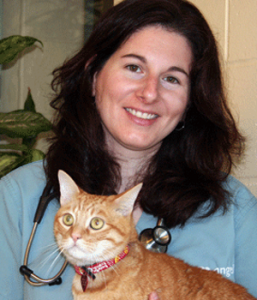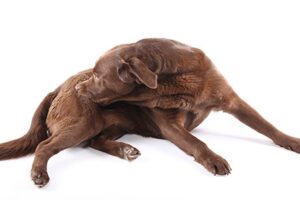-
Adopt
-
Veterinary Care
Services
Client Information
- What to Expect – Angell Boston
- Client Rights and Responsibilities
- Payments / Financial Assistance
- Pharmacy
- Client Policies
- Our Doctors
- Grief Support / Counseling
- Directions and Parking
- Helpful “How-to” Pet Care
Online Payments
Referrals
- Referral Forms/Contact
- Direct Connect
- Referring Veterinarian Portal
- Clinical Articles
- Partners in Care Newsletter
CE, Internships & Alumni Info
CE Seminar Schedule
Emergency: Boston
Emergency: Waltham
Poison Control Hotline
-
Programs & Resources
- Careers
-
Donate Now
 Mara Ratnofsky, DVM
Mara Ratnofsky, DVM
angell.org/generalmedicine
generalmedicine@angell.org
617-522-7282
“Hot spots,” also known as moist dermatitis, superficial pyoderma, or pyotraumatic dermatitis, are areas of skin that become infected after sustaining superficial damage. While healthy skin is able to prevent the bacteria on its surface from overgrowing, damaged skin does not have the same defenses and is prone to infection. Initially a hot spot may just look like a red, moist patch of skin, but as it progresses it can spread to large areas of the body, start to ooze, develop an odor, and form large crusts. The dog may lose hair around the hot spot and the affected area may be itchy and quite painful.
 Anything that causes a dog to scratch, lick, or chew at its skin can lead to a hot spot. Common triggers are environmental allergies, food allergies, fleas, insect bites, wounds, and ear infections, although behavioral issues such as anxiety or boredom can also result in chronic licking/chewing of the skin. Hot spots tend to be most common in large breed dogs with heavy coats and occur mainly during warm, humid weather. Dogs that swim or stay wet for long periods are also predisposed.
Anything that causes a dog to scratch, lick, or chew at its skin can lead to a hot spot. Common triggers are environmental allergies, food allergies, fleas, insect bites, wounds, and ear infections, although behavioral issues such as anxiety or boredom can also result in chronic licking/chewing of the skin. Hot spots tend to be most common in large breed dogs with heavy coats and occur mainly during warm, humid weather. Dogs that swim or stay wet for long periods are also predisposed.
Treatment of a hot spot usually starts with clipping the fur from the affected area to allow air to circulate and to make it easier to apply topical medications. The area is cleansed and either topical or oral antibiotics may be prescribed. Astringent medications can be applied to help dry out the hotspot, and pain medications and/or anti-itch medications can help keep the dog comfortable while the skin heals. An Elizabethan-collar (or “cone”) can be useful to stop the dog from licking or chewing long enough for the hot spot to resolve.
If your dog is prone to hot spots, there are a few things you can do to try to prevent them. Make sure your dog is protected against fleas, ticks, and mosquitoes by using appropriate preventatives. Ask your veterinarian about the possibility of underlying allergies if your dog frequently seems itchy. Dry your pet thoroughly after swimming or bathing. Consider clipping your dog’s fur in the summer if he or she has a thick coat. If a behavioral problem is a suspected cause of the licking/chewing, talk to your veterinarian about ways to reduce your dog’s stress. Sometimes increasing exercise, spending more time with your dog, or offering toys that provide food rewards is enough, but other times specialized training or medication may be required.
For information about Angell’s General Medicine service, please visit www.angell.org/generalmedicine or call 617-522-7282.